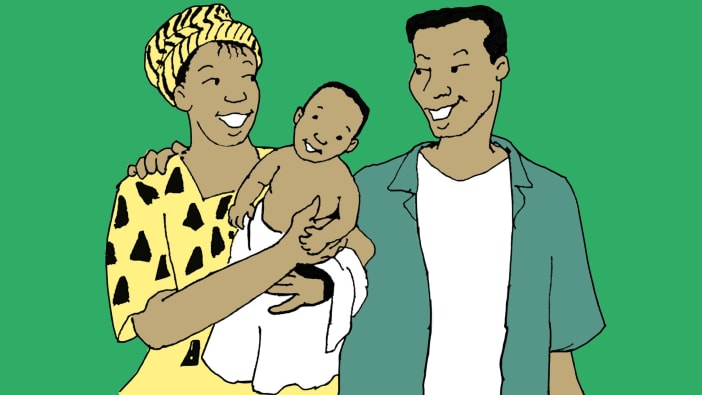As well as the question ‘when?’, a birth plan needs to answer the questions ‘who?’, ‘where?’, ‘how?’ and ‘what?’
WHO? A trained person, preferably a professionally trained health worker, should be present at the birth. Who will this be and how will you contact her or him to say that labour is starting?
WHERE? Decide where the safest place to give birth is. Find out the phone numbers of the health facility and the nearest hospital. Check you have a number that will be answered at all hours, not just when the place is open. In rural areas without phone lines, can you call a mobile number to get medical help?
HOW? Reliable transport is very important. Do you need a few different options in case the first doesn’t work out?
WHAT? Near the due date, prepare a bag ready for going to the health centre or hospital. This might include notes made by health workers at appointments during pregnancy (antenatal appointments), some money for food and drink, a change of clothes, a blanket to wrap the baby in, and baby clothes. It is also a good idea to take a mobile phone and a charger for keeping in touch – a phone could be borrowed from a friend or relative.
Saving money for medical care
- Estimate costs by talking with neighbours and local health workers.
- Work out how much needs to be saved each month in the months leading up to the birth.
- Work out what needs to be spent during pregnancy, for example on travelling to attend antenatal appointments.
- Remember that attending antenatal appointments can prevent an expensive emergency!
Existing savings groups and self-help groups can help each other with medical costs. An envelope of ‘emergency money’ could be given to a pregnant group member, with the expectation that it would be paid back if it was used. If it is not used, it could be passed to the next pregnant woman in the group.
Emergency birth plan
An emergency birth plan is needed in case the main birth plan cannot be followed. For example:
- if labour starts early
- if labour progresses very quickly
- if you see any of the danger signs in labour (see here)
- if a transfer from a health centre to hospital is necessary.
Think about the possibilities and work out what would be needed, such as use of a neighbour’s car, or a loan from a relative to pay for transport. Ask people in advance if they will help you in an emergency. It will prevent dangerous delays.
Family and community
If a mother travels to receive medical help, neighbours and relatives often take care of her other children while she is absent. Churches can support new mothers by providing meals for several days or helping out with tasks like cleaning the house.
You might ask what the point is in having a family and community plan, if other people will help out anyway without one. The point is to enable the mother to travel to a health centre to give birth without worrying about what is happening at home. It will ensure that everyone who is helping will know what has to be done, who will do it, and when it will be done.
In some places there are ‘maternity villages’ with good health facilities, trained midwives and places for women to stay. Women can travel to these villages in time for their expected delivery date. This will mean a few days or even a week or so away from the family.
Helping others to make plans
Role plays for use with groups:
- SCENE The moment the family contacts the midwife or birth attendant. Create two alternative versions – one where the family has a plan and knows what to do, and one where things go wrong because there is no plan in place.
- SCENE A woman wants to go against tradition by giving birth in a health centre rather than in her mother’s house. Her husband has given permission for this. The woman speaks to her mother about her decision and asks her to help look after the family while she is giving birth.
Planning happens in different ways. Help others to think through the following:
- Which people need to be approached for advice or permission?
- What needs to be written down?
Material taken from Where Women Have No Doctor, with thanks to the publishers, Hesperian, for permission (see Resources for website and address).







